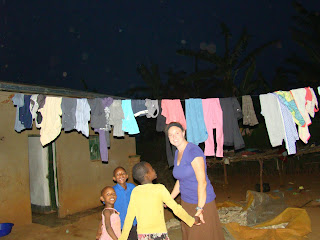August 9th, 2012
Aroni. Aroni. Chris. Mama Shalom. Providance. Chris. Aroni. Aroni. Chris. Aroni…..
And so it continued at our final design team meeting. We read names out loud from ballots one by one to tabulate results for our governance committee elections. Over the weekend, the original six members of the design team had invited four new community members to join the cooperative, three of whom were men, and now the ten team members (plus Gilbert and me) were holding elections to determine the leadership of the cooperative after my departure.
 |
| Recognizing our team for their tremendous efforts this summer. From L to R, Mama Marie, me, Mama Shalom, Donata, Juliette, and Angelique (Denyse, not pictured) |
I knew who I wanted to win. Denyse should be the president. She attended every meeting with a smile on her face and participated actively throughout the Innovation Institute. Or it could be Mama Shalom, unarguably the “chief of the house” who we all know would be able to get things done. Angelique would be VP or Treasurer; she knows everyone in the village from her health care work. Mama Marie would be elected secretary, as she already helps with land registration and can read and write well. It never occurred to me that the elections would turn out any other way. Yet as we counted the votes the new members and the men were clearly winning. I could feel my blood pressure rising.
As it became clear that either Chris or Aroni had the most votes for President, I pulled Gilbert (my translator) aside, away from the group. “Gilbert, this is not good. Is it too late to make a new rule? Shouldn’t the president have to be a member of our original team?” Gilbert, also rather surprised at the results of the election, stood there for a minute thinking. Looking at the rest of the team sitting in the grass and staring at inquisitively, he finally said, “We can’t change the rules now, it’s too late. They know what they are doing. It will be ok.” I hesitated before going back to the group to proceed.
The election continued in this fashion. President: Aroni. Vice President: Chris. Treasurer: Providence, also new. At the end three of the five members of the governance committee were not from our original design team, and both the president and vice president were men. I was gutted.
 |
| Our team with new members at our final meeting/election |
It will not be ok, I whispered to Gilbert! How could this happen? The election wasn’t supposed to go this way! I had very intentionally picked a group of strong women for my design team, and now in an instant my team was turning over the reins to men who had just joined the project. While feeling defeated inside, I tried to hide my disappointment as we shared mundazi (donut like pastries)and Fantas, a special treat, to celebrate our accomplishments this summer.
I came home after the meeting to a swarm of my favorite neighborhood children, and we had one more backyard concert as dark settled in. Neighbors stopped by and laughed one more time at our song and dance before the long line of hard, teary-eyed goodbyes began. As Mama Shalom was putting the finishing touches on dinner, Aroni, the newly-elected cooperative president and schoolteacher who is also Papa Shalom’s cousin, came through the gate to the backyard.
 |
| Evening song and dance in the back yard |
In that moment, I felt my anxiety start to slowly melt away. I remembered my first night in Nyarubuye when Aroni walked me home with Papa Shalom from the football field. I remembered the next night when he taught me to count to 10 in Kinyarwanda. And I remembered the evenings that we sat in the backyard practicing conjugating verbs by the light of my headlamp. Aroni was a life-long educator with a decent command of English and a strong commitment to Nyarubuye and my family. I hated to admit it, but maybe my team was right in electing him president after all?
Falling asleep under my mosquito net that night, I flashed back to our first few days in Kigali in June. When we arrived in Rwanda, our goal was to leave having cultivated unique projects that our teams could own and continue themselves. The elections didn’t go as I had planned, but in the voting process, my team expressed their own knowledge of village politics and cultural dynamics that I was perhaps unable to see. They overwhelmingly believed that Aroni was the one who could help the project to succeed, and who was I to question that? The election was democracy in all its glory. As I handed over our materials, budget, and ledger to our new leaders, I felt like many pieces of our work were incomplete, like the real work was only just beginning. I didn’t want to let go not knowing what would happen next, but the influx of new members and their enthusiasm for our project showed that the team was indeed committed to forging ahead. With that, our time in Nyarubuye came to a close in the blink of an eye. The story of my summer in Rwanda ends here, but I’m hoping that the election shows that that of the Abashyizehamwe Muburezi cooperative is only just beginning.














